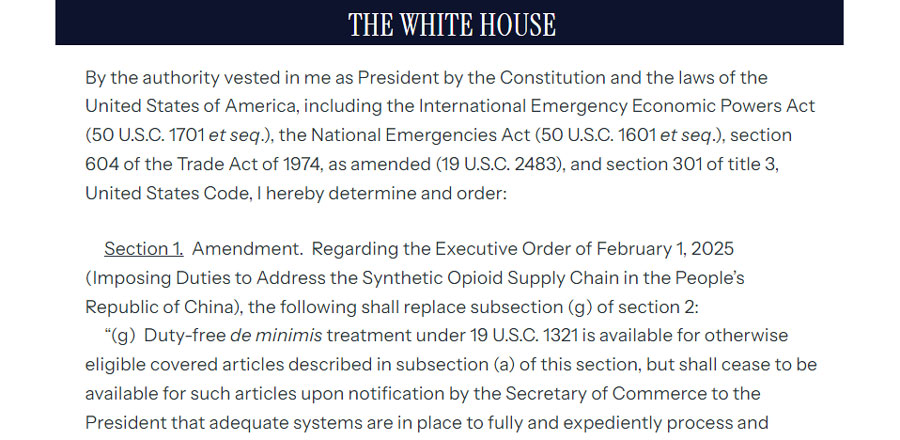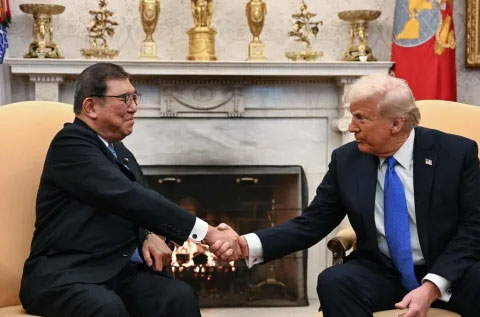

The United States restores tax exemption for small parcels in China
Us trade policy is erratic and executive orders are constantly changing.
According to a new executive order signed by US President Donald Trump, a "minimum" tariff exemption will continue to be allowed for small packages from China valued at less than $800, which also reverses some provisions of the executive order he signed on February 1 to impose tariffs on China.
Some analysts said that this adjustment was mainly due to the "confusion in the implementation of new tariffs" by the relevant departments in the United States, resulting in a large backlog of goods. Because small parcel customs clearance will greatly increase the burden of postal, customs and agency departments.
According to Reuters, Trump said on February 7 local time that he would announce the implementation of "reciprocal tariff measures" next week. Reuters commented that this is a "major escalation" in tearing up and reshaping global trade relations in favor of the United States.
In a meeting with visiting Japanese Prime Minister Shigeru Ishiba on February 7, Trump announced the above news, "I will announce next week that we will implement reciprocal trade so that we are treated equally with other countries," and "we will ask for neither more nor less." It is understood that the relevant tariff measures will be applied to all countries.
The imposition of tariffs by the United States has been met with many objections. Us public opinion believes that the US tariff measures may affect the US economic growth, but harm the interests of the United States. Some US politicians have said that the Trump administration's tariff policy is "the stupidest trade war in history".
Regarding the impact of the frequent trade war launched by the United States, the two major liner giants Maersk and Hapag-Lloyd have recently voiced their voices respectively.
Maersk Chief Executive Vincent Clerc believes the imposition of punitive tariffs by the United States will not have much impact on freight volumes in 2025, when global freight demand is expected to grow by 4 percent year-on-year.
He further stressed that what really matters is not punitive tariffs, but the purchasing power of consumers. At the same time, resilience is key to dealing with trade wars and global instability.
Hapag-lloyd CEO Rolf Habben Jansen takes a similar view. He said the US tariffs on China would not have much impact on the flow of goods. Trump also imposed tariffs in his first term, but global trade is still doing well. "The president of the United States also wants the U.S. economy to grow, and for that they will need more goods."
According to a new executive order signed by US President Donald Trump, a "minimum" tariff exemption will continue to be allowed for small packages from China valued at less than $800, which also reverses some provisions of the executive order he signed on February 1 to impose tariffs on China.

Some analysts said that this adjustment was mainly due to the "confusion in the implementation of new tariffs" by the relevant departments in the United States, resulting in a large backlog of goods. Because small parcel customs clearance will greatly increase the burden of postal, customs and agency departments.
According to Reuters, Trump said on February 7 local time that he would announce the implementation of "reciprocal tariff measures" next week. Reuters commented that this is a "major escalation" in tearing up and reshaping global trade relations in favor of the United States.
In a meeting with visiting Japanese Prime Minister Shigeru Ishiba on February 7, Trump announced the above news, "I will announce next week that we will implement reciprocal trade so that we are treated equally with other countries," and "we will ask for neither more nor less." It is understood that the relevant tariff measures will be applied to all countries.

The imposition of tariffs by the United States has been met with many objections. Us public opinion believes that the US tariff measures may affect the US economic growth, but harm the interests of the United States. Some US politicians have said that the Trump administration's tariff policy is "the stupidest trade war in history".
Regarding the impact of the frequent trade war launched by the United States, the two major liner giants Maersk and Hapag-Lloyd have recently voiced their voices respectively.
Maersk Chief Executive Vincent Clerc believes the imposition of punitive tariffs by the United States will not have much impact on freight volumes in 2025, when global freight demand is expected to grow by 4 percent year-on-year.
He further stressed that what really matters is not punitive tariffs, but the purchasing power of consumers. At the same time, resilience is key to dealing with trade wars and global instability.
Hapag-lloyd CEO Rolf Habben Jansen takes a similar view. He said the US tariffs on China would not have much impact on the flow of goods. Trump also imposed tariffs in his first term, but global trade is still doing well. "The president of the United States also wants the U.S. economy to grow, and for that they will need more goods."





